初中英语课本第二册(1982年版)
(美音版)新概念英语第二册:Lesson 82 Monster or fish?

(美音版)新概念英语第二册:Lesson 82 Monsteror fish?Lesson 82 Monster or fish?是妖还是鱼?First listen and then answer the question.听录音,然后回答以下问题。
What was the monster called?Fishermen and sailors sometimes claim to have seen monsters in the sea.渔夫和水手们有时声称自己看到过海里的妖怪。
Though people have often laughed at stories told by seamen,虽然人们常常对水手们讲的故事付诸一笑,it is now known that many of these 'monsters' which have at times been sighted are simply strange fish.但现在看来,人们有时看到的这些“妖怪”很多不过是些奇怪的鱼。
Occasionally, unusual creatures are washed to the shore, but they are rarely caught out at sea.一些异常的生物偶尔会被冲到岸上来,但它们在海上却极少能被捕到。
Some time ago, however, a peculiar fish was caught near Madagascar.不过不久前,在马达加斯加附近的海里却捕到了一条奇怪的鱼。
A small fishing boat was carried miles out to sea by the powerful fish as it pulled on the line.一条小渔船被一条咬住钩的强壮的大鱼拖到了几英里以外的海面上。
新概念英语第二册 lesson 82 综合性课件
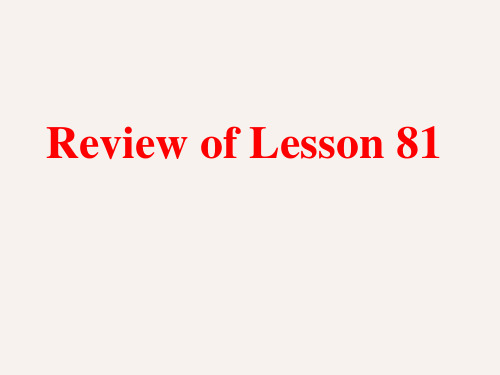
Yeti
You might run into a Yeti in the Himalayas, or just see a few footprints, if you are lucky!
half-man and half-beast
[ə'bɒm(ə)nəb(ə)l] adj. 讨厌的;令人憎恶的;糟透的
According to some witnesses, it is colorless and it moves at a slow, steady speed with little noise.
A spaceship from another planet ? A satellite? A weather balloon? Can’t tell? That’s why it is called ahe early time
one of the planet's great mysteries
李湘 Candy
Crop circle in the late time
They are becoming more and more complex.
What’s the crop circle ?
sharp blow drive off
Lead in
Brainstorming questions: Have you heard of something not only
interesting and attractive but also unexplained in the world ?
拖进 在黑暗中 换衣服 穿着蓝色制服 肩扛步枪 来回,前后 到处 就在那时 在…停下来 立正 感到惋惜/难过 将某人重击倒在地 开走
初中英语第二册(上)
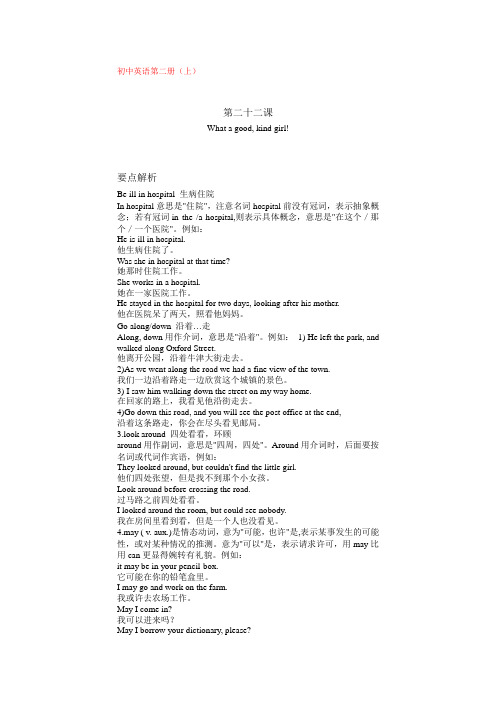
初中英语第二册(上)第二十二课What a good, kind girl!要点解析Be ill in hospital 生病住院In hospital意思是"住院",注意名词hospital前没有冠词,表示抽象概念;若有冠词in the /a hospital,则表示具体概念,意思是"在这个/那个/一个医院"。
例如:He is ill in hospital.他生病住院了。
Was she in hospital at that time?她那时住院工作。
She works in a hospital.她在一家医院工作。
He stayed in the hospital for two days, looking after his mother.他在医院呆了两天,照看他妈妈。
Go along/down 沿着…走Along, down用作介词,意思是"沿着"。
例如:1) He left the park, and walked along Oxford Street.他离开公园,沿着牛津大街走去。
2)As we went along the road we had a fine view of the town.我们一边沿着路走一边欣赏这个城镇的景色。
3) I saw him walking down the street on my way home.在回家的路上,我看见他沿街走去。
4)Go down this road, and you will see the post office at the end,沿着这条路走,你会在尽头看见邮局。
3.look around 四处看看,环顾around用作副词,意思是"四周,四处"。
Around用介词时,后面要按名词或代词作宾语,例如:They looked around, but couldn't find the little girl.他们四处张望,但是找不到那个小女孩。
初中英语课本第二册(1982年版)

初中英语课本第二册LESSON 3DRILLS〔句型练习〕AWhat’s in the room? There’s a table.Are there any bowls on the table? Yes, there are.And there are some plates, too.BWhat’s on the two plates? There’s some fish on one plate.There’s some bread on the other.What’s in the bowls? There’s some meat in this one.There isn’t any meat in that one. There’s some rice in it.CWhat’s in those glasses? There’s some water in them.Please pass me a glass of water. Here you are.What’s in these cups? There’s some tea in them.Please give him a cup of tea. All right.DAre there any cups on the table? Yes, there are.Is there any tea in that blue cup? Yes, there is.Is there any tea in that green one? No, there isn’t. There’s some milk in it. DIALOGUE〔对话〕SUPPER IS READYMum: Lingling!Ling: Yes, Mum?Mum: Supper is ready.Ling: All right.Dad: Hurry!Mum: Sit down. Lingling. Here’s your rice.Ling: Thanks. Oh, there’s fish and chicken! Meat too!And eggs!Why so much, Mum?Mum: It’s your daddy’s birthday.Ling: Oh! Happy birthday, Dad!Dad: Thank you, Lingling. Help yourself to some fish.Ling: Thank you.GRAMMAR〔语法〕可数和不可数名词〔Countable and Uncontable Nouns〕,英语名词分可数名词和不可数名词两类。
新概念英语第二册第82课-Monster or fish-

新概念英语第二册第82课:Monster or fish?Lesson 82 Monster or fish?是妖还是鱼? First listen and then answer the question.听录音,然后回答以下问题。
What was the monster called?Fishermen and sailors sometimes claim to have seen monsters in the sea. Though people have often laughed at stories told by seamen, it is now known that many of these 'monsters' which have at times been sighted are simply strange fish. Occasionally, unusual creatures are washed to the shore, but they are rarely caught out at sea. Some time ago, however, a peculiar fish was caught near Madagascar. A small fishing boat was carried miles out to sea by the powerful fish as it pulled on the line. Realizing that this was no ordinary fish, the fisherman made every effort not to damage it in any way. When it was eventually brought to shore, it was found to be over thirteen feet long. It had a head like a horse, big blue eyes, shining silver skin, and a bright red tail. The fish, which has since been sent to a museum where it is being examined by a scientist, is called an oarfish. Such creatures have rarely been seen alive by man as they live at a depth of six hundred feet.参考译文渔夫和水手们有时声称自己看到过海里的妖怪。
新概念英语第二册课文讲解L82
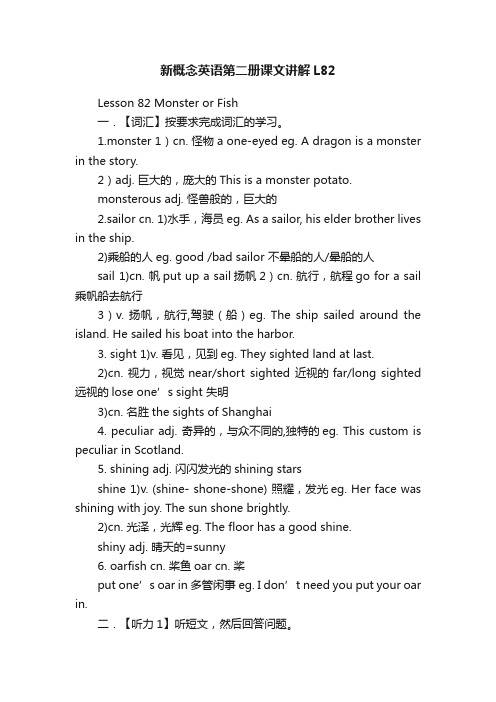
新概念英语第二册课文讲解L82Lesson 82 Monster or Fish一.【词汇】按要求完成词汇的学习。
1.monster 1)cn. 怪物a one-eyed eg. A dragon is a monster in the story.2)adj. 巨大的,庞大的This is a monster potato.monsterous adj. 怪兽般的,巨大的2.sailor cn. 1)水手,海员eg. As a sailor, his elder brother lives in the ship.2)乘船的人eg. good /bad sailor 不晕船的人/晕船的人sail 1)cn. 帆put up a sail扬帆2)cn. 航行,航程go for a sail 乘帆船去航行3)v. 扬帆,航行,驾驶(船)eg. The ship sailed around the island. He sailed his boat into the harbor.3. sight 1)v. 看见,见到eg. They sighted land at last.2)cn. 视力,视觉near/short sighted 近视的far/long sighted 远视的lose one’s sight 失明3)cn. 名胜the sights of Shanghai4. peculiar adj. 奇异的,与众不同的,独特的eg. This custom is peculiar in Scotland.5. shining adj. 闪闪发光的shining starsshine 1)v. (shine- shone-shone) 照耀,发光eg. Her face was shining with joy. The sun shone brightly.2)cn. 光泽,光辉eg. The floor has a good shine.shiny adj. 晴天的=sunny6. oarfish cn. 桨鱼oar cn. 桨put one’s oar in 多管闲事eg. I don’t need you put your oar in.二.【听力1】听短文,然后回答问题。
初中英语课本第一册(1982年版)

初中英语课本第一册LESSON 1Letters: A B C D E F G Words: face, bag, bee, bedLESSON 2Letters: H I J K L M N Words: bike, chick, cake, handLESSON 3Letters: O P Q R S T Words: rose, dog, jeep, pen, knife, shipLESSON 4Letters: U V W X Y ZWords: student, bus, plane, apple, sheep, egg, coat, orangeLESSON 6DRILLS(句型练习)AThis is a book. That’This is a pen. That’s a chair.BWhat’s this? It’ a cake.What’s that? It’s an egg.What’s that? It’s an orange.LESSON 7DRILLS(句型练习)AWhat’s this? It’s a bus. It’s a red bus.What’s that? It’s a car. It’s a blue car.BIs this a jeep? Yes, it is. Is it green? Yes, it is.CIs this a ship? Yes, it is. What colour is it? It’s yellow.Is that a plane? Yes, it is. What colour is it? It’s white.DIALOGUE(对话)A:What colour is this apple?B:It’s red.A:What colour is that banana?B:It’s yellow.A:What colour is an orange?B:Why, it’s orange. An orange is orangeLESSON 8DRILLS(句型练习)AThis is my cup. It isn’t your cup. My cup is white. Your cup is yellow. That isn’t his bike. It’Her bike is green.Is this your desk? Yes, it is. Is that your chair? No, it isn’t. It’s his chair. Is this your rubber? Yes, it is. Is that your ruler? No, it isn’t. It’s her ruler. DIALOGUE(对话)Tom:Kate!Kate:Yes?Tom:Is this your knife?Kate:No, it isn’t.* * *Kate:Tom! Is this your pencil-box?Tom:Yes, it is. Thank you.Kate:That’s all right.LESSON 9DRILLS(句型练习)Aone ship; two ships; three cakes; four coats; five beds;six bees; seven bananas; eight oranges; nine buses; ten boxes;BThese are apples. Those aren’t apples. They’re oranges.The apples are here.These are desks.The desks are here. The tables are there.DIALOGUE(对话)A:Look,what’s this?B:It’s a ship.A:No,it’s a sheep. These are all sheep. They’re white sheep. What are those? B:Why, they’re sheep, too. They’re black sheep.A:No, they aren’t sheep. They’re goats.GRAMMAR(语法)名词的复数形式(The Plural Number of Nouns)(Ⅰ)1、一般在单数名词末尾加-s:book-----books ruler-----rulers egg-----eggs student-----students hand-----hands rose-----roses orange-----oranges2、以s、x等结尾的词加-es:bus-----buses box-----boxes注:knife的复数形式为knives,sheep的复数形式和单数形式相同。
新概念英语第二册课文讲解 L82
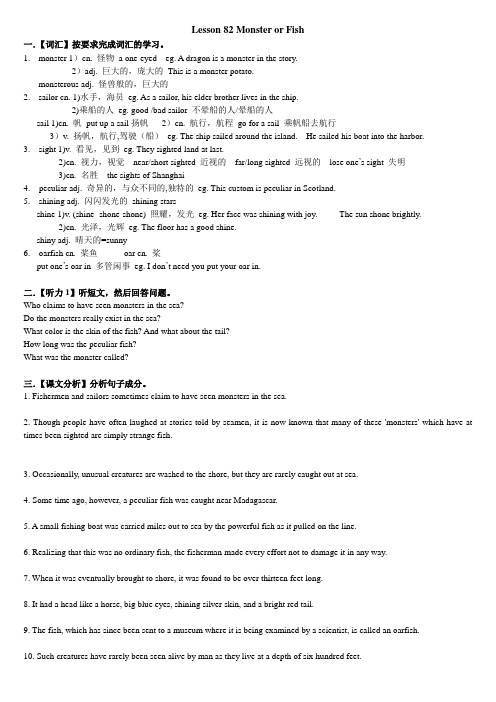
Lesson 82 Monster or Fish一.【词汇】按要求完成词汇的学习。
1.monster 1)cn. 怪物a one-eyed eg. A dragon is a monster in the story.2)adj. 巨大的,庞大的This is a monster potato.monsterous adj. 怪兽般的,巨大的2.sailor cn. 1)水手,海员eg. As a sailor, his elder brother lives in the ship.2)乘船的人eg. good /bad sailor 不晕船的人/晕船的人sail 1)cn. 帆put up a sail扬帆2)cn. 航行,航程go for a sail 乘帆船去航行3)v. 扬帆,航行,驾驶(船)eg. The ship sailed around the island. He sailed his boat into the harbor.3. sight 1)v. 看见,见到eg. They sighted land at last.2)cn. 视力,视觉near/short sighted 近视的far/long sighted 远视的lose one’s sight 失明3)cn. 名胜the sights of Shanghai4. peculiar adj. 奇异的,与众不同的,独特的eg. This custom is peculiar in Scotland.5. shining adj. 闪闪发光的shining starsshine 1)v. (shine- shone-shone) 照耀,发光eg. Her face was shining with joy. The sun shone brightly.2)cn. 光泽,光辉eg. The floor has a good shine.shiny adj. 晴天的=sunny6. oarfish cn. 桨鱼oar cn. 桨put one’s oar in 多管闲事eg. I don’t need you put your oar in.二.【听力1】听短文,然后回答问题。
中国外语教育发展史回顾
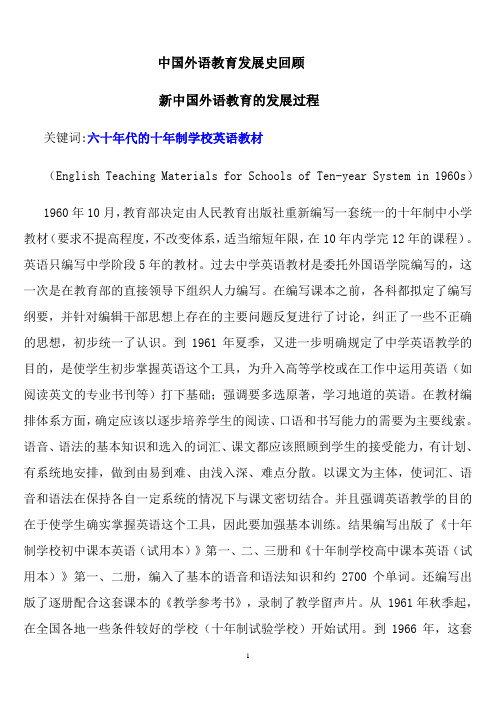
中国外语教育发展史回顾新中国外语教育的发展过程关键词:六十年代的十年制学校英语教材(English Teaching Materials for Schools of Ten-year System in 1960s)1960年10月,教育部决定由人民教育出版社重新编写一套统一的十年制中小学教材(要求不提高程度,不改变体系,适当缩短年限,在10年内学完12年的课程)。
英语只编写中学阶段5年的教材。
过去中学英语教材是委托外国语学院编写的,这一次是在教育部的直接领导下组织人力编写。
在编写课本之前,各科都拟定了编写纲要,并针对编辑干部思想上存在的主要问题反复进行了讨论,纠正了一些不正确的思想,初步统一了认识。
到1961年夏季,又进一步明确规定了中学英语教学的目的,是使学生初步掌握英语这个工具,为升入高等学校或在工作中运用英语(如阅读英文的专业书刊等)打下基础;强调要多选原著,学习地道的英语。
在教材编排体系方面,确定应该以逐步培养学生的阅读、口语和书写能力的需要为主要线索。
语音、语法的基本知识和选入的词汇、课文都应该照顾到学生的接受能力,有计划、有系统地安排,做到由易到难、由浅入深、难点分散。
以课文为主体,使词汇、语音和语法在保持各自一定系统的情况下与课文密切结合。
并且强调英语教学的目的在于使学生确实掌握英语这个工具,因此要加强基本训练。
结果编写出版了《十年制学校初中课本英语(试用本)》第一、二、三册和《十年制学校高中课本英语(试用本)》第一、二册,编入了基本的语音和语法知识和约2700个单词。
还编写出版了逐册配合这套课本的《教学参考书》,录制了教学留声片。
从 1961年秋季起,在全国各地一些条件较好的学校(十年制试验学校)开始试用。
到1966年,这套教材刚好用完一轮。
文化大革命开始,这套教材被贬为“封、资、修的大杂烩”,停止使用。
这套课本是建国以来第二套中学英语通用教材。
它克服了过去强调政治内容、不注意学语言的偏向,重视了培养学生运用英语的能力。
改革开放30年的中小学英语教材

改革开放30年的中小学英语教材人民教育出版社刘道义在改革开放的30年中,中小学英语教材建设大体可分为三个阶段:1978年至1988年,1988年至2001年,2001年至今。
在这三个历史阶段,中小学英语教材不断改革创新。
现在,分别介绍三个历史阶段的中小学英语教材编制情况及其特点。
一、以结构主义语言教学理论为基础编制的通用中小学英语教材1978年,全国教材会议英语编写组编订了《全日制十年制中小学英语教学大纲(试行草案)》,并且编写了小学英语课本六册、初中英语课本六册和高中英语课本二册。
此外,为了适应当时高中英语教学的需要,1979年秋季编辑出版了程度较低的过渡性的高中代用课本二册。
配合各册课本使用还编写了供教师使用的教学参考书。
这套教材对拨乱反正,纠正不顾外语教学规律突出政治的错误倾向,对稳定教学秩序,保证教学质量起到了重要的作用。
1980年,教育部颁发了《全日制十年制中小学英语教学大纲(试行草案)》。
1982年秋,中小学开始使用新编的英语课本(小学1~4册,初中1~6册)。
接着,在1984年开始使用高中课本(1~3册)。
这一套统编教材一直用到1998年(最后一届高三学生),是建国后使用时间最长的英语教材。
这个期间,尽管教学大纲几经调整,但教材没有做大的变动,仅相应作了修订和调整(主要是减轻分量)。
领导这段时期教材编制工作的是人民教育出版社张志公和唐钧。
1986年11月,根据“适当降低难度,减轻学生负担,明确教学要求”的原则,教材审定委员会审查通过了1986年的《全日制中学英语教学大纲》。
这个大纲确定,中学外语科有两个起点,一个是从初中一年级开始,另一个是从高中一年级开始,其要求接近初中一年级开始的外语课的要求。
人民教育出版社根据大纲的精神,听取了广大师生对现行教材的意见,对教材作了适当的修订,降低了难度。
也就是根据这个大纲和教育部《关于加强中学外语教育的意见》,人教社在现行初、高中教材的基础上编辑出版了高中起始的英语教材,共六册。
第二册新概念英语NCE2_Lesson82 Monster or fish(共18页)最新精品课件.ppt

► pressure n.压力、麻烦 under the pressure of 在…的压力下
press v. (1)按、压
press the button (2)强迫 eg. Please don't press me. 别逼我。 press for 要求 press for higher wages 要求提高工资
► extent (1)程度 to some extent=to a certain extent 在某种程度上
to a great extent= to a large extent (2)宽度、大小 a vast extent of land 广大的土地 ► gratitude n.感激 反义词 ingratitude out of gratitude 出于感激 ► object v. 不赞成、反对 object to 反对 (to是介词+v.-ing形式)
eg. His new novel is due to issue next month. 他的新小说将于下个月发行。 (2)到期的
eg. He didn't pay the rent when it was due. 到期的时候,他还没付房租。 due to 归咎于、由于
eg. The game was postponed due to rain.这场比赛由于下雨而终止。 eg. Her word-wide fame is due to his support. 她的世界闻名归咎于他的支 持。
2.How long will the strike last? At least a week 3.What have university students volunteered to
新概念英语第二册第80课-The Crystal Palace

新概念英语第二册第80课:The CrystalPalaceLesson 80 The Crystal Palace水晶宫First listen and then answer the question.听录音,然后回答以下问题。
How many people visited the Great Exhibition of 1851?Perhaps the most extraordinary building of the nineteeth century was the Crystal Palace, which was built in Hyde Park for the Great Exhibition of 1851. The Crystal Palace was different from all other buildings in the world, for it was made of iron and glass. It was one of the biggest buildings of all time and a lot of people from many countries came to see it.A great many goods were sent to the exhibition from various parts of the world. There was also a greatdeal of machinery on display. The most wonderful piece of machinery on show was Nasmyth s steam hammer. Though in those days, traveling was not as easy as itis today, steam boats carried thousands of visitors across the Channel from Europe. On arriving in England, they were taken to the Crystal Palace by train. There were six million visitors in all, and the profits from the exhibition were used to build museums and colleges. Later, the Crystal Palace was moved to South London.It remained one of the most famous buildings in the world until it was burnt down in 1936.参考译文19世纪最不寻常的建筑也许要数水晶宫了,它是为1851年的“世界博览会”而建在海德公园的。
新概念英语第二册 lesson 82 综合性课件

Today we'll listen to a story about a strange sea monster. Listen to the story and see if you can answer this question: What was the monster called?
Answer:An oarfish.
Crop circles are reported to appear mostly in Spring and Summer.
Where do they come from?
the creation of alien visitors mysterious forces or unknown energies entirely man-made
Sea horse
He protects their young kids until they are able to live on their own.
It can also make a sound like beating a drum.
Some other lives
Sea anemone [ə'nemənɪ]n. 银莲花;银莲花属;海葵
Practise reading
Questions on the text 1.What is now known about the monsters fishermen and sailors claim to have seen? It is now known that those monsters are simply strange fish. 2.Why was a small fishing boat carried miles out to sea some time ago near Madagascar? Because a powerful fish pulled on the line. 3. What did the fishermen do then? He realized that was not an ordinary fish and he made every effort not to damage it in any way. 4.What did the fish look like? Tt was over thirteen feet long with a head like a horse, big blue eyes, shining silver skin, and a bright red ta the fish climb trees ? Can the fish generate electricity ? Can the fish make a sound ? Can the fish smell blood several kilometers away?
新概念英语第二册82课

• 指人时它可以表示怜爱等感情,多用于指女性
• 这个小可怜在那段时间受了很大的罪。
• The poor creature has suffered a lot during that time.
第十页,共14页。
Comprehension questions
6. Where was a peculiar fish caught? 7. When was it caught?
第十一页,共14页。
Comprehension questions
8. How was a small fishing boat carried miles out to sea? 9. What did the fisherman realize? 10. What did he try hard not to do? 11. Where was it eventually brought? 12. How long was it found to be? 13. What kind of head had it got?
• Out of sight, out of mind.
• (谚)眼不见,心不烦 • 3)v. 看见 • Several rare animals have been sighted there in
recent years.
第二页,共14页。
❖creature ['kri:tʃə] n.动物、生物
1. What do fishermen and sailors sometimes claim?
2. What have people often laughed at?
新概念英语第二册 Lesson 81— 82(共38张PPT).

sailor n. 海员
sight n. 见到
creature n. 动物,生物
peculiar adj.
奇怪的,不寻常的
shining adj. oarfish n. 桨鱼
闪闪发光的
Questions on the text
Language points
Fishermen and sailors sometimes claim to have seen monsters in the sea. He claimed that he found the money in the forest. He claimed to be a Scot but had a powerful Liverpool accent.
march v. 行进
boldly adv. 胆大地 blaze v. 闪耀 salute v. 行礼 elderly adj.上了年纪的 grey adj. 灰白的 sharp adj. 猛烈的 blow n. 打击
Questions on the text
Language points
Working rapidly in the darkness, he soon changed into the dead man’s clothes.
…dressed in a blue uniform and with a rifle over his shoulder,…
He could hear shouting in the camp itself.
Though people have often laughed at stories told by seamen, it is now known that many of these ‘monsters’ which have at times been sighted are simply strange fish.
初中英语课本第1册(1982年版)资料

初中英语课本第1册(1982年版)初中英语课本第一册LESSON 1Letters: A B C D E F G Words: face, bag, bee, bedLESSON 2Letters: H I J K L M N Words: bike, chick, cake, handLESSON 3Letters: O P Q R S T Words: rose, dog, jeep, pen, knife, shipLESSON 4Letters: U V W X Y ZWords: student, bus, plane, apple, sheep, egg, coat, orangeLESSON 6DRILLS(句型练习)AThis is a book. That’This is a pen. That’BWhat’s this? It’ a cake.What’s that? It’What’s that? It’s an orange.LESSON 7DRILLS(句型练习)A仅供学习与交流,如有侵权请联系网站删除谢谢2What’s this? It’s a bus. It’s a red bus.What’s that? It’s a car. It’s a blue car.BIs this a jeep? Yes, it is. Is it green? Yes, it is.CIs this a ship? Yes, it is. What colour is it? It’s yellow.Is that a plane? Yes, it is. What colour is it? It’s white.DIALOGUE(对话)A:What colour is this apple?B:It’s red.A:What colour is that banana?B:It’s yellow.A:What colour is an orange?B:Why, it’s orange. An orange is orangeLESSON 8DRILLS(句型练习)AThis is my cup. It isn’t your cup. My cup is white. Your cup is yellow. That isn’t his bike. It’Is this your desk? Yes, it is. Is that your chair? No, it isn’t. It’s his chair. Is this your rubber? Yes, it is. Is that your ruler? No, it isn’t. It’s her ruler. DIALOGUE(对话)Tom:Kate!仅供学习与交流,如有侵权请联系网站删除谢谢3Kate:Yes?Tom:Is this your knife?Kate:No, it isn’t.* * *Kate:Tom! Is this your pencil-box?Tom:Yes, it is. Thank you.Kate:That’s all right.LESSON 9DRILLS(句型练习)Aone ship; two ships; three cakes; four coats; five beds;six bees; seven bananas; eight oranges; nine buses; ten boxes;BThese are apples. Those aren’t apples. They’re oranges.The desks are here. The tables are there.DIALOGUE(对话)A:Look,what’s this?B:It’s a ship.A:No,it’s a sheep. These are all sheep. They’re white sheep. What are those? B:Why, they’re sheep, too. They’re black sheep.仅供学习与交流,如有侵权请联系网站删除谢谢4A:No, they aren’t sheep. They’re goats.GRAMMAR(语法)名词的复数形式(The Plural Number of Nouns)(Ⅰ)1、一般在单数名词末尾加-s:book-----books ruler-----rulers egg-----eggs student-----students hand-----hands rose-----roses orange-----oranges2、以s、x等结尾的词加-es:bus-----buses box-----boxes注:knife的复数形式为knives,sheep的复数形式和单数形式相同。
新概念英语第2册-L82

monster1)n.怪物a one-eyed monster独眼怪物eg:A dragon is a fabulous monster. 龙是一个传说中的怪物2)巨大物、(做形容词)巨大eg:The spaceship was a real monster.巨大的宇宙飞船monstrous adj. 畸形的,怪异的,巨大的a monstrous iceberg 巨大的冰山monstrously adv.sailor1)n.海员、水手eg:His father is a sailor.他的父亲是个海员。
2)乘船的人(与adj.连用)a good sailor不晕船的人←→a bad sailor晕船的人sail(同音词sale)1)n.帆put up a sail扬帆2)n.航行、航程go for a sail 乘船去航行eg:It’s a forty-minute sail from Dove to Calais.从多佛到加来需45分钟的航行in full sail以全速;set sail 启航3)v.扬帆、航行,(使)行使eg:The yacht sailed around the cape. 那艘游艇绕岬航行。
eg:He sailed his boat into the harbor. 他将船直接驶向港口。
eg:Can you sail a yacht?你会驾驶游艇?sail close to the wind 几乎犯法;冒风险sailing n.航海;sailing boat (英)帆船(美:sail boat)sight1)v.见到eg:They sighted land at last.他们终于看见陆地了2)n.视力、视觉near sighted =short sighted 近视far sighted=long sighted 远视lose one’s sight失明3)n.视野go out of sight 从视线消失、看不见了;come in sight 映入眼帘in sight 看得见,被见到;在望,在即eg:I caught sight of his tall figure in the crowd. 在人群中我看见他高大的身影。
初中二年英语Lesson 82课件
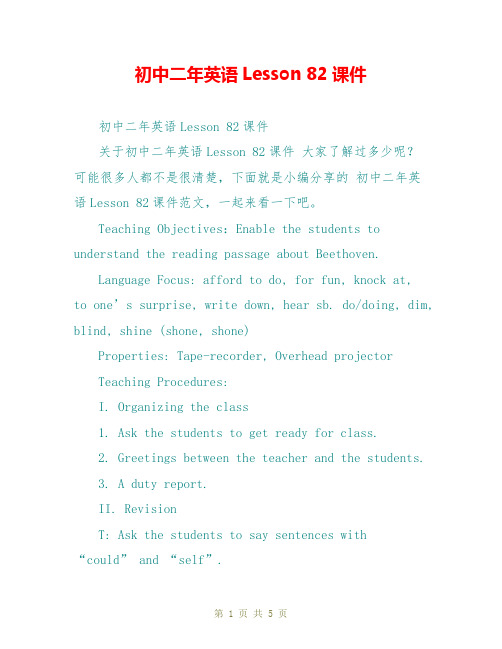
初中二年英语Lesson 82课件初中二年英语Lesson 82课件关于初中二年英语Lesson 82课件大家了解过多少呢?可能很多人都不是很清楚,下面就是小编分享的初中二年英语Lesson 82课件范文,一起来看一下吧。
Teaching Objectives:Enable the students to understand the reading passage about Beethoven.Language Focus: afford to do, for fun, knock at,to one’s surprise, write down, hear sb. do/doing, dim, blind, shine (shone, shone)Properties: Tape-recorder, Overhead projectorTeaching Procedures:I. Organizing the class1. Ask the students to get ready for class.2. Greetings between the teacher and the students.3. A duty report.II. RevisionT: Ask the students to say sentences with“could” and “self”.III. Reading1. Pre-reading:Ask the students the following questions before reading.(1) Do you like listening to music?(2) What do you know about Beethoven?(3) Can you play any musical instruments? How well can you play?(4) The teacher gives a brief introduction of Beethoven.2. While-reading:(1) Ask the students to read the passage silently by themselves.(2) Ask the students to answer the reading comprehension questions.(3) Play the tape for the passage and ask the students to read after the tape.(4) Explain the language points.①sonata/s[5na:t[/: musical composition for one instrument(eg. the piano) ,or two(eg. piano andviolin) , normally with three or four movements. 奏鸣曲②afford to do: (通常与can, could, be able to连用)spare or find enough time or money for–We can’t afford to go away this summer.–I can help you.They aren’t able to afford to buy a big apartment. So they have to live in a small house.③to one’s surprise = to the surprise of sb.To my surprise/To the surprise of everyone, his plan succeeded. I feel very happy for this.To our surprise, he survived in the aircraft. Good luck!3. After-reading(1) Ask the students to retell the passage.(2) Ask the students to talk about their feelings after reading the passage.(3) Ask the students to work in pairs and then act it out.IV. Exercises in class根据句意填空。
- 1、下载文档前请自行甄别文档内容的完整性,平台不提供额外的编辑、内容补充、找答案等附加服务。
- 2、"仅部分预览"的文档,不可在线预览部分如存在完整性等问题,可反馈申请退款(可完整预览的文档不适用该条件!)。
- 3、如文档侵犯您的权益,请联系客服反馈,我们会尽快为您处理(人工客服工作时间:9:00-18:30)。
初中英语课本第二册LESSON 3DRILLS(句型练习)AWhat’s in the room? There’s a table.Are there any bowls on the table? Yes, there are.And there are some plates, too.BWhat’s on the two plates? There’s some fish on one plate.There’s some bread on the other.What’s in the bowls? There’s some meat in this one.There isn’t any meat in that one. There’s some rice in it.CWhat’s in those glasses? There’s some water in them.Please pass me a glass of water. Here you are.What’s in these cups? There’s some tea in them.Please give him a cup of tea. All right.DAre there any cups on the table? Yes, there are.Is there any tea in that blue cup? Yes, there is.Is there any tea in that green one? No, there isn’t. There’s some milk in it. DIALOGUE(对话)SUPPER IS READYMum: Lingling!Ling: Yes, Mum?Mum: Supper is ready.Ling: All right.Dad: Hurry!Ling: I’m coming. Hello, Dad. Hello, Mum.Mum: Sit down. Lingling. Here’s your rice.Ling: Thanks. Oh, there’s fish and chicken! Meat too!And eggs!Why so much, Mum?Mum: It’s your daddy’s birthday.Ling: Oh! Happy birthday, Dad!Dad: Thank you, Lingling. Help yourself to some fish.Ling: Thank you.GRAMMAR(语法)可数和不可数名词(Countable and Uncontable Nouns),英语名词分可数名词和不可数名词两类。
1、可数名词有复数形式,如:an apple two applesa book three booksa car some cars2、不可数名词一般没有复数形式,如:water: a glass of watertwo glasses of watersome waterrice a bowl of ricetwo bowls of ricesome riceLESSON 4DRILLS(句型练习)AWe have a TV set. Have you a TV set?No, we haven’t.Tom has a story-book. Has Jack a story-book, too? No, he hasn’t.He has some picture-books.Have you any ink? Yes, I have some. Give me some ink, please.Here you are. Thank you.DHas Mary any paper? No, she hasn’t.Pass her a piece of paper, please. All right.TEXT(课文)WHAT IS IT?I have a good friend. It has a round face. On its face, it has three hands. One is short, the other two are long. It has no arms, but its hands turn round and round. It has no feet or legs, but it can go all day and all night.It has no eyes and no ears. It has no mouth, but it can talk. In the morning it can wake me up and tell me, “It ’s time to get up.”What is it?GRAMMAR (语法)动词have(verb to have)1、I haveWeYou have You have(not) …He (not) … TheyShe hasIt2LESSON 6DRILLS (句型练习)AIs this new shirt mine? No. It ’s your father ’s. Oh, it ’s his.Is that one mine? Yes, that ’s yours.BWhose jacket is this? It ’s Kate ’s. Oh, it ’s hers.Which one is yours? The white one.CIs this room yours? No. It ’s Mike and John ’s. Oh, It ’s theirs.Which one is yours? The next one is ours.DAre these cups yours? Only some of them.Which ones are yours? The blue ones are ours.DIALOGUE (对话)TWO YOUNG PIONEERSLiu: Look, Zhang Ling. What ’s that? It ’s a watch, isn ’t it?Zhang: Yes. What a nice watch!Liu: It’s quite new!Zhang: Look, there’s a man over there. Perhaps it’s his.Liu: Let’s go and ask him.Zhang: All right.Liu: Excuse me, comrade. Is this watch yours?Man: No, it’s not mine.(they see a woman nearby)Liu: Excuse me, is this watch yours?Woman: No, it isn’t.Zhang: Let’s go and give it to the policeman.Liu: OK.(they go to a policeman nearby)Zhang: Excuse me.Policeman: Yes? Can I help you?Liu: Here’s a watch. We can’t find the owner. Can you find him and give it to him?Policeman: Certainly. Thank you. You’re good Young Pioneers. GRAMMAR(语法)LESSON 7DRILLS(句型练习)AI’m talking. You aren’t talking. You’re listening to me.We’re reading now. Tom and Mike aren’t reading. They’re doing exercises. Rose is writing. Jack isn’t writing. He’s looking out of the windowBClose the door please, Alice.What are you doing, Alice? I’m closing the door.Open the window please, Alice!What’s she doing, Peter? She’s opening the window.CRead the text please, Joan and Rose.What are they doing? They’re reading the text.Write down the new words, please.What are you doing? We’re writing down the new words.TEXT(课文)ON A BUSIt is Sunday today. Wang Lin and Li Ping are going to the zoo. They are waiting for a bus.A red bus is stopping at the bus stop. Wang Lin and Li Ping are getting on the bus.“Here’s a seat for you, Wang Lin.”“No, thank you. There’s another seat. I can sit over there.”The bus is coming to the next stop. Now, an old woman is getting on the bus. Wang Lin and Li Ping both stand up. Li Ping is saying:“Here’s a seat for you, Granny. Please sit here.”Wang Lin is also saying:“Please come here and have my seat, Granny.”“Mine is near the door. So take this seat, please, Granny.”“Thank you very much. It’s very nice of you.”LESSON 8DRILLS(句型练习)AAre you cleaning your classroom? Yes, we are.Are they cleaning their classroom?No, they aren’t. They’re cleaning the dinning-room.BIs Zhang Hong carrying water? Yes, he is.Is Liu Ying cleaning the window?No, she isn’t. She’s cleaning the door.CWho’s taking down the old picture? Our teacher is.Who’s putting up the new ones? Our monitor is.DWho’s sweeping the floor? Some of the boys are.Who’s cleaning the desks and chairs? Some of the girls are.TEXT (课文)PLANTING TREESIt is March now. Spring is here. It is time to plant trees.Look! There ’s a little child in front of the house. What is she doing? She is watering some flowers. Who are the man and the woman beside the house? They are the girl ’s parent. What are they doing? They are planting trees.Look at the children near the river. They are Young Pioneers. Are they playing or working? They are working. They are planting apple trees. Some are digging, some are planting. Some are carrying water, others are watering the trees. All of the children are busy.On the hill there are also a lot of people. What are they doing? They are planting trees, too. Look at all the young trees on the hill.How hard all these people are working! They are helping to make our country beautiful.GRAMMAR (语法)现在进行时(The Present Continuous Tense)1、现在进行时表示现在正在进行或发生的动作。
